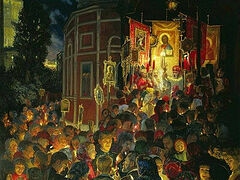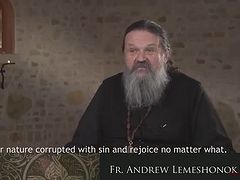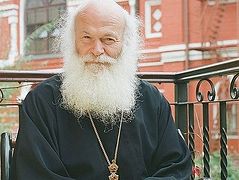Christ is Risen! But are we with Him?
The manuscript of our sins weeps.
And in our belated repentance
There’s no Divine light, but only the kingdom of darkness.
But this kingdom doesn’t frighten
Him who beholds the Crucified:
The Risen One now enlightens
The three-day tomb of any soul!
Hieromonk Roman (Matyushin-Pravdin)
Igumen Cyprian (Parts) from Moscow’s Sretensky Monastery talks about Paschal joy and the prerequisites for it.
—Father Cyprian, if a person feels joy at Pascha, how can he hold onto it?
—Before the Revolution, there was an elder living in the Gethsemane Skete of the Holy Trinity-St. Sergius Lavra. He used to eat rye bread crumps at Pascha. Once his cell-attendant said to him: “Father, you should have some Pascha cheese and kulich. It’s Pascha, after all!” The schemamonk asked: “Why?” “Because it’s Pascha!” The elder replied: “Son, I have Pascha every day.”
—But we can’t live like this, feeling Pascha every day, especially in the world…
—You see, it’s not about where you live, but the disposition of the soul. When it comes to Paschal joy, our Pascha isn’t what, but Who. Our Pascha is the Lord Himself. So, if the Lord comes first in your heart, then it’s always Pascha for you. And the way to truly put the Lord first is through repentance.
Repentance is, as Archpriest Valerian Krechetov said, the nerve of the spiritual life. Nerves control our entire body, and repentance should rule our whole life, and we should make following Christ the main work of our lives. The goal of our life should be the acquisition of the grace of the Holy Spirit, as St. Seraphim of Sarov said. To do this, we need to remain in a state of repentance—not in the sense of having a gloomy face or some kind of mechanical self-condemnation, but in the sense of having the goal to gain a contrite and humble heart.
As Psalm 50 say: A sacrifice unto God is a broken spirit: a heart that is broken and humbled God will not despise (Ps. 50:17). This means that other sacrifices from us—people who are in an impassioned state—aren’t accepted by God, but only this one. We can’t offer burnt offerings with our whole lives—it will be a strange fire on God’s altar. Our task is to acquire this contrite and humble heart. This is attained through obeying the Gospel commandments, forcing yourself to fulfill them.
—The hymns of the services of the Pentecostarion call us to joy. In the stichera of Pascha we hear: “With joy let us embrace one another.” How can we combine the spirit of repentance and this joy to which the Church is now calling us?
—In fact, repentance is not a gloomy and sorrowful state. Repentance is light. As the Holy Fathers say: “joy-making lamentation”—that is, contrition about your condition, about your sins in the presence of God, and joy from this presence of God.
How can we make ourselves rejoice? It’s a feeling. We force ourselves by our will. There’s a saying: “You can’t dictate to your heart.” And we can’t order the heart how to feel by our own will. This living sense of God’s presence in the heart is given only by the Lord Himself.
That is, it all comes down to the fact that we must do everything in our power, but it’s up to the Lord to enliven our hearts. We can’t enliven them ourselves—only the Lord can. Good desires in the heart come from the grace of God. How can we create this life inside ourselves? It’s the Lord Himself Who does it. And the goal of our lives is for the Lord to look down upon our modest labors for salvation, and upon us. And this should be the main work of our lives.
As Archimandrite John (Krestiankin) said: “Everything begins with a living appeal to the Living God.” No one will do it for us. We can ask other people to pray for us and can hope for their prayers, but we must understand that we have to do it; no one else will.
After his repose, the Venerable Nilus the Myrrh-Gusher appeared to a monk on Mt. Athos and told him about another monk: “I know him and help him, but I can’t supply his soul.” You see how such a great saint prayed, but he couldn’t do for the monk what he himself had to do. A personal appeal to God and walking in God’s presence is what we should concern ourselves with above all. But we should know that this is hard work.
Schema-Archimandrite John (Maslov), a monk of the Holy Trinity-St. Sergius Lavra, formerly of the Glinsk Hermitage, wrote to the Venerable Andronik (Lukash), another Glinsk elder, in Tbilisi: “It’s difficult to walk in the presence of God all the time.” Even such a great elder who possessed the gifts of the Holy Spirit said that it was hard... This is labor for us.
What does St. Ephraim the Syrian ask for in his prayer? What does he want to get rid of first of all? Sloth. Unless we force ourselves to walk in the presence of God and personally turn to the Lord, this is that sloth. You can live like this for a very long time, but what will it lead to?...
What does St. Ephraim the Syrian say? “...Sloth, despair, lust of power, and idle talk,” right? These are the things that we must beware of above all. Make an effort to walk in the presence of God, to live according to His commandments, to not succumb to despair if it comes, to not seek the first place, to place yourself lower, and to watch your tongue.
—Father Cyprian, I’ve read and heard that some people don’t feel that Pascha has arrived. They don’t have that joy. What would you advise them?
—Give yourself up to repentance and seek God. There’s an expression: “Seek God, and your soul shall live.” These words are from the Prokeimenon read at the very beginning of Great Lent. There’s no other recipe. But we must seek Him both by personal appeal to Him and by deed. That is, forcing yourself to fulfill the Gospel commandments is also seeking God.
—By fasting, praying, making prostrations...
—This is the external aspect. Reading prayers, prostrations—this is bodily labor. In no case should they be neglected. The Venerable Isaac the Syrian says that this external worship of God—making prostrations, standing erect and reverently in church—is extremely important.
Those who neglected these outward forms of worship said that God should be worshipped only by spirit and fell into delusion. There was even such a heresy—you can find it in St. Isaac the Syrian—of those who denied the outward manifestations of piety. These labors are needed. True, these aren’t fruit—they’re leaves. But, as we know, leaves must first appear on a tree, and then the fruit. Otherwise, there’ll be no fruit. Of course, this isn’t yet a fruit, but all this is simply necessary. And standing and prostrating is very, very important for us during our private prayers.
Of course, God doesn’t need this bodily labor, just as He doesn’t need our prayers. We need all this. These things, I repeat, are simply vital, if possible, of course. If you’re exhausted and your legs can’t hold up, it’s clearly better to think about God sitting down than to think about your legs standing up. Everything should be according to your capacity. It’s a matter of conscience. But this labor of forcing yourself is essential.
—Should we necessarily wait for this joy?
—The Kingdom of God doesn’t come with observance. We can’t say God has to give us something, and there’s no guarantee we’ll be happy about it. You reap what you sow. And indeed, during Great Lent our task is to acquire this Paschal leaven, which will need to be preserved for a whole year till the next Great Lent. We make a mistake when Lent is over and we let ourselves go, allowing ourselves to overeat, and, to put it crudely, taking a break from the spiritual life. We mustn’t do this.
The Lord says: My thoughts are not your thoughts (Is. 55:8). And if we don’t feel something, we don’t have to get upset about it. We’re on the front. Our warfare is continuous, every day, whether it’s Pascha, Great Lent... It’s always war. Imagine if something doesn’t go well for a soldier and he gets upset—will it benefit him? Will it help him fight? No. So the point is to not yield to despondency. It attacks us, but that doesn’t mean we have to follow its lead.







